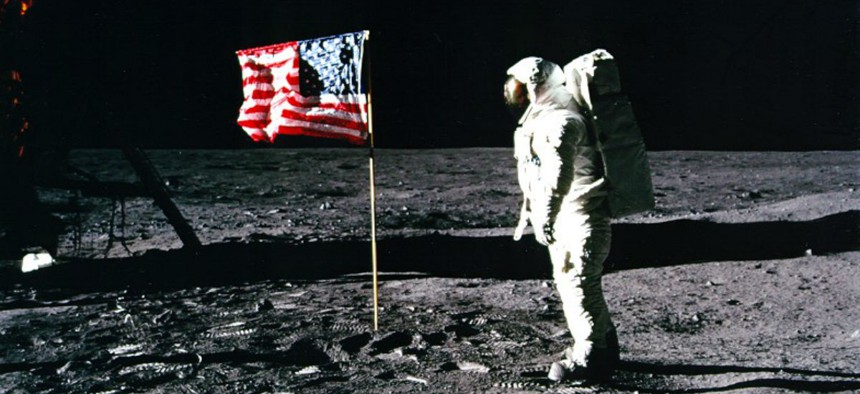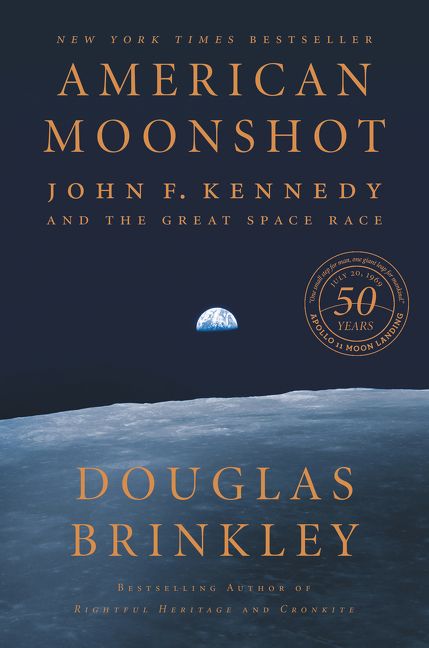
Astronaut Buzz Aldrin salutes the American flag during the Apollo 11 mission. NASA photo
Going to the Moon: Reflections on a Government Success Story 50 Years Later
“The real heroes of Project Apollo were public servants,” says historian Douglas Brinkley.
On July 20, 2019, the nation will celebrate the 50th anniversary of one of the federal government’s greatest success stories: the Apollo 11 moon landing. In his new book, American Moonshot: John F. Kennedy and the Great Space Race, historian Douglas Brinkley describes then-President Kennedy’s decision to send astronauts to the moon and how federal leaders planned and executed the mission. Mark Abramson recently spoke with Professor Brinkley, the Katherine Tsanoff Brown Chair in Humanities and Professor of History at Rice University, about American Moonshot and the factors that determine whether government missions are successful.
Mark Abramson: What are the origins of American Moonshot?
Douglas Brinkley: I grew up in Northwest Ohio in Perrysburg. I was eight-and-a-half years old when Apollo 11 landed. It was a highwater mark in my youth. Ohio has a long history of aviation pioneers: the Wright Brothers, John Glenn, Neil Armstrong. My house was full of NASA memorabilia. I was excited that we had gone to the moon.
There were several other key events leading to American Moonshot. In 2001, NASA invited me to interview Neil Armstrong as part of their oral history project. It was an incredible experience. In 2005, I moved from Tulane University to Rice University in Houston. Rice has a long historical relationship with NASA. My office is short walk from the Rice football stadium where President Kennedy delivered his famous 1962 speech on reasons for going to the moon. Also, in recent years, NASA has released new documents in their archives and important documents have been declassified. There is now a robust field of space history.
I also discovered that nobody had written a book about President Kennedy’s decision to go to the moon. I thought I could finish the book before the 50th anniversary of the Apollo landing. It took me three years of non-stop writing to finish the book.
MA: What has been the reaction to the book?
DB: I have been surprised by the amount of mail I have received. Hundreds of people have written to me thanking me for writing American Moonshot. They told me about their participation in the project—some as government employees and some as contractors. They wrote about the great pride they still feel in being part of the Apollo project. They wrote about working for NASA on a specific launch or writing a computer program for the mission. These letters demonstrated the satisfaction that working on an important public mission can bring to people. Over 400,000 citizens were involved in getting us to the moon.
MA: What lessons did you learn about what it takes for government to plan and execute a successful program?
DB: The most important lesson is that leadership starts at the top. You need true leadership that stays focused on the task at hand, which President Kennedy provided. Another lesson is the importance of working with both Democrats and Republicans, which President Kennedy did. Hyper-partisanship is not useful in getting things done.
During the planning of Project Apollo, NASA did two important things. First, they listened to political reality. They knew that they would have to engage the entire nation in the project. They made sure many states received government funding as part of Apollo. Second, they made smart decisions about contractors and subcontractors. They choose the best companies to participate in Apollo. They knew which companies had the engineering and technical know-how. The government did not waste money in going to the moon. The project came in well within budget. The 1961 funding estimate was between $20 to $40 billion. The government did not underestimate the cost. The final cost was about $25 billion.

Project Apollo also showed us that great leaders and presidents can bring the government together with the private sector and academia. An effective president learns how to engage other leaders and bring them together with government to work on common goals. We need a healthy relationship with the private sector and citizens.
In addition, President Kennedy was a master salesperson for NASA. He told the country that space exploration was going to be expensive and would cost every family 50 cents a week. NASA continued to communicate effectively with the public throughout the Apollo program. The agency constantly communicated the benefits of space exploration for the nation.
The real heroes of Project Apollo were public servants. They were top notch people who got the job done. My experience has shown me that government employees are very honorable people doing first-rate work. I regret that they are often get beat up by pundits and do not receive the credit they deserve.
MA: I enjoyed your book The Great Deluge: Hurricane Katrina, New Orleans, and the Mississippi Gulf. Hurricane Katrina clearly demonstrated an unsuccessful government program. How would you contrast that with the success of Project Apollo?
DB: Presidents have an obligation to pick the right, qualified people to run their agencies. President Kennedy picked James Webb to run NASA. He had exactly the right credentials. President George W. Bush picked Michael Brown to run FEMA. Brown had no managerial skills. He had previously been the head of the International Arabian Horse Association. FEMA did not have a leader who knew how to talk to the nation, which created a lack of confidence by the public in FEMA.
During the hurricane relief efforts, FEMA seemed AWOL. NASA talked directly to Americans throughout Project Apollo and was honest about their successes and failures throughout the project. NASA during Apollo is a real role model in communicating with the public. Government agencies do not communicate as well today.
My admiration for James Webb increased throughout my research for the book. He was an ex-Marine who understood science and industrial mobilization. Coming from North Carolina, he also knew how to talk to Southern congressmen during deliberation over NASA’s budget. He was a smooth operator and knew how to manage and how to work effectively in Washington.
Project Apollo demonstrated the importance of presidential and agency leadership. President Kennedy demonstrated constant vigilance in ensuring that NASA was being run effectively.
MA: You have also written about Teddy Roosevelt in the Wilderness Warrior and Franklin Roosevelt in Rightful Heritage. What did you learn from both Roosevelts and President Kennedy?
DB: I learned about the importance of a “can do” positive attitude. Teddy Roosevelt, Franklin Roosevelt, John Kennedy, and Ronald Reagan were all successful in providing optimism to the public. Presidents need to capture the imagination of the public and provide the nation with goals on which they can pull together. It is healthy for the nation to have ideas and goals being debated, such as a war on cancer and an “earth shot.”
The Roosevelts and President Kennedy talked about the importance of public service. Another President, James Madison, said that democracy can only work if our leaders are explaining government and the constitution to citizens. The nation should now be devoting more time to treating history as an important subject. Too many young people today don’t understand the importance of serving our country.
MA: In 1999, you published The Unfinished Presidency: Jimmy Carter’s Journey Beyond the White House. Have you thought about updating it?
DB: Yes, I would like to update his post-presidency. As historians, we tend to give Presidents upward revisions as we get further away from their presidencies. Gerald Ford, Jimmy Carter, and George H. W. Bush are all receiving upward revisions. The only exception is Richard Nixon. His tapes included anti-Semitic and other derogatory language which have hurt his presidential standing.
I have found that if you live your life with deep-seated integrity, history will treat you well. People like George Shultz and Zbigniew Brzezinski demonstrated integrity and telling the truth to their bosses. You have to be honest and not abandon your principles in government. It is all too easy to not tell the truth to your boss in order to stay in good standing with the boss.
MA: Tell us more about your views on the importance of public service.
DB: There are amazing things happening today in NASA and other government agencies. I am concerned that many young people are not considering going into government. Many are being poached by the private sector. I hope that the private sector space companies will not dominant recruiting the current scientific talent pool.
We need to convince young people that serving in government can be both exciting and important. I hope government can make itself attractive to millennials. Government service has many rewards and can be very exciting. Public servants might make less money than they could in the private sector, but it is hard to put a price tag on serving your country.
Mark A. Abramson is president of Leadership Inc. His most recent book is Government for the Future: Reflection and Vision for Tomorrow’s Leaders (with Daniel J. Chenok and John M. Kamensky). His email address is mark.abramson@comcast.net.
NEXT STORY: Welcome to the New Government Executive






